
You're reading an excerpt from People Matter, the (short) book on people-focused IT administration.
You can pay-what-you-want for a full copy at https://leanpub.com/people-matter
"May" and "Thank You"
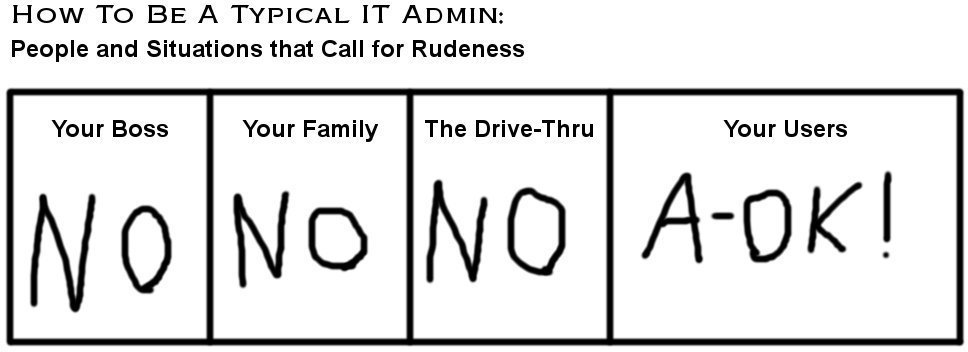
When you want something from somebody, frame the question so that it begins with "May I." When the person allows you to have what you want, say "Thank you." and give them a warm smile.
Why is this important?
I have seen IT people with terrible attitudes. They are rude to everybody, and the only reason they still have a job is because they haven't made anybody angry enough, yet. I have also found that most of the time, the terrible attitude is a reflection of inner chaos. They feel unloved or uncared about.
People who don't work in IT have the same attitudes, sometimes. As human beings, we all need kind words in order to live well.
You may think that kind words are for counselors and therapists, and those are certainly important parts of those professions. But kindness and a good attitude do wonders wherever they are used. You may not be able to change the world, but you are able to make a difference in your circle with the words you use. Start with the man in the mirror, don't wait for others to be kind first.
Doing Rounds
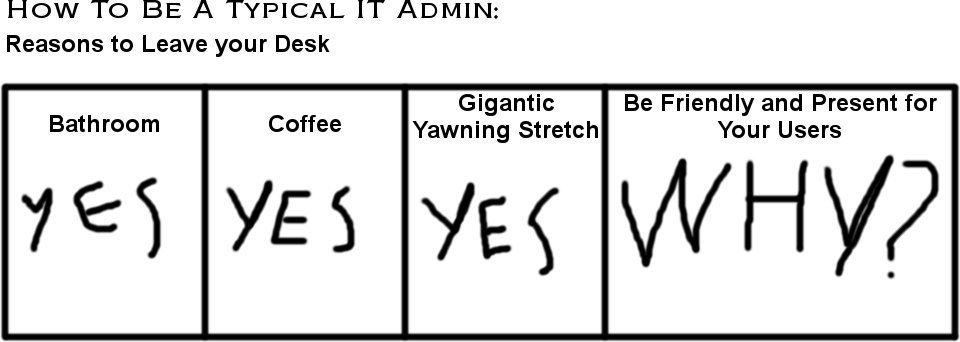
As often as you can, daily being the goal, go around to all the stations in your office and ask people, one-on-one or by room, if they are having computer issues.
Being an IT admin is a bit like being a doctor. You are dealing with complex problems, that require intense focus, understanding of the human element, and the knowledge you have learned from study and experience.
Doctors do rounds of their wards almost every day. Why are you sitting behind your desk when you could be up and around, talking and connecting with your co-workers, and sometimes finding issues before they become big ones?
I have done this every day that I am in the office for quite some time. It makes people feel cared about, that you are taking the time to talk to them individually. They will often remember minor issues that they had and would have forgotten to tell me about otherwise.
If you discover Two Minute Issues while doing rounds, you do not need to wait to fix them. Just fix them.
Working an Issue
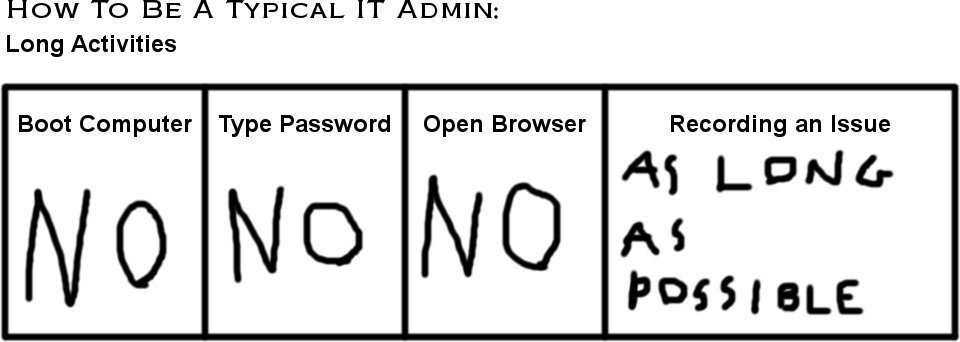
When you do discover an IT issue, bring something to write or type with. Understand the circumstances under which the error or issue occurred, and get just what you need to reproduce it.
If this takes more than 5 minutes, then the issue is extremely complex or you are doing it wrong. When you waste others' time, they learn not to call you when issues arise.
If you insist on sitting down at the computer and working the controls yourself during the initial discovery, you are doing it wrong. Sometimes, a particular workflow is the difference between issue and non-issue, and so it is important that you observe instead of taking over.
After the user has left for the day, then it is acceptable to take all the time you need to tackle the issue. The exception to this rule is when the user cannot do any work until you fix things.
When you are ready to communicate your findings, or if you just need more information, make your communication good.
Good Communication
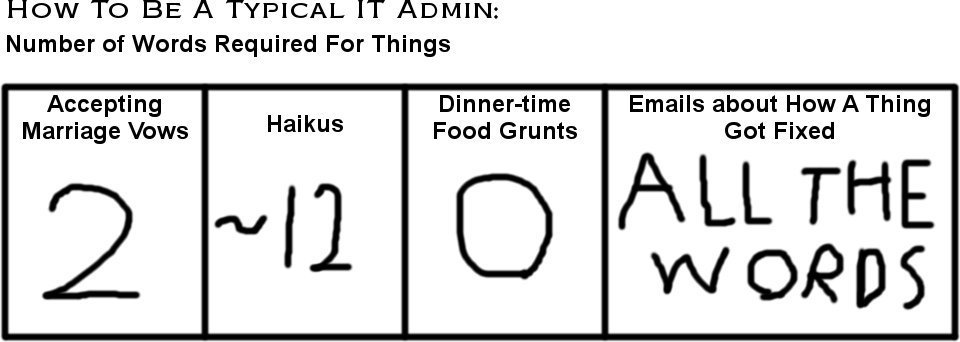
Your communication with others should be minimal. Again, do not waste somebody's time. If you are tempted to communicate, think first about whether you are actually in need of information that you cannot get any other way. Many times, I am able to get the information I need without bothering anybody.
When you do communicate, be jargon-free and clear. You would not expect your spouse (unless you are *very* lucky) to know what Group Policy does. Do not expect your users to know what it is either.
Optionally, your communication should have a touch of humor in it. I find that self-deprecating humor is the most effective and concise kind. You are not a comedian, but a little chuckle goes a long way.
When possible, talk to people face-to-face. After that, give them a phone call. Only as a last resort should you write an email. Personal communication shows that you care, and it's also harder for a user to "miss the memo" when you're making eye contact with them.
When you do write emails, make your paragraphs short and punchy. Vertical space is a good thing, and it can be used to draw attention and clarify ideas, just like silence can do for your words. If you know that you are prone to typos, print out important drafts before you send them, and go over them with a pen.
Reading Deeply
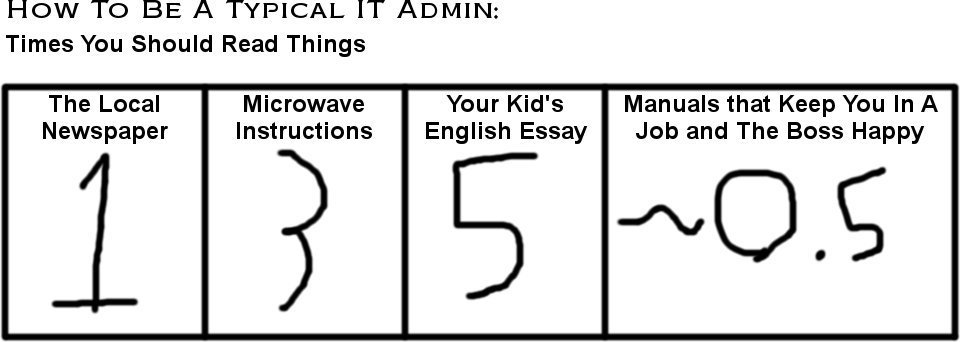
I have a bad habit of reading quickly and missing details. To compensate for that, I read important documents or emails once quickly and then after that I narrow in on the parts that I find most interesting.
Even then, I often miss what I am looking for, and only a final, deep read fixes that.
If you are like me, then slow down and take a deep breath when reading an important document of any kind.
Two Heads are Better
If you can, always do IT in a pair or small group.
IT is hard, and it can be very lonely if you're the only person at the office who really understands your network. That loneliness will impact your work.
Having two people also adds some flexibility and redundancy to the IT department. You may feel like you are not allowed to be sick if you are a lone wolf. Having a backup will allow you to take time for yourself when you need it.
Having two people in the IT department also allows one of you to play devil's advocate when necessary.
Remote is Remotely Effective

Working remotely is decent enough for computers, but damaging to people.
The second half of my pair has been working mostly remotely for some time, and when he comes in it is usually only after hours. People half-seriously ask me if he works here any more.
When you are not a physical presence, it is easy for people to forget about you. Then, when a crisis arises, and you have the hard task of correcting bad behavior, people will demonize you. Being forgotten and demonized robs you of the power to do your job effectively.
There are other dangers to working mostly remotely. Diagnosing a whiny fan is difficult unless you're at the office. Also, you must assume the minds and working circumstances of your users in order to know how to help them. You cannot tell that your printer placement interrupts work constantly or cramps a workspace until you experience it for yourself.
The moral of the story: Sometimes, remote work is necessary. But it should be a small minority of your total work hours.